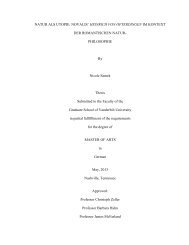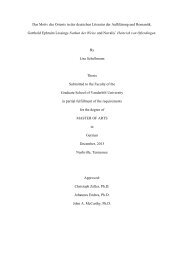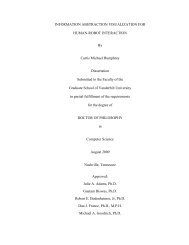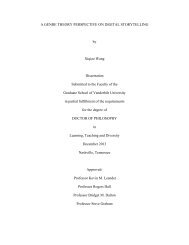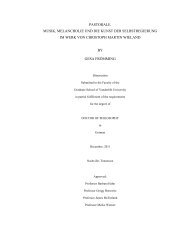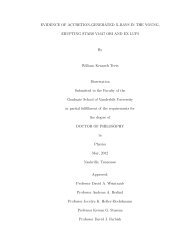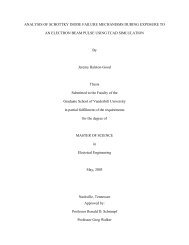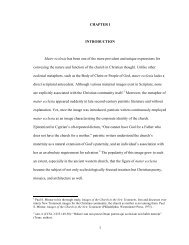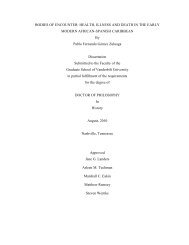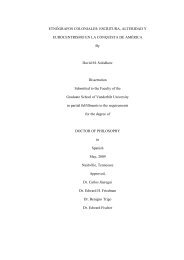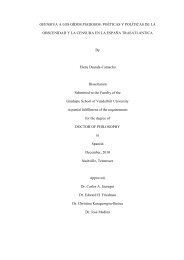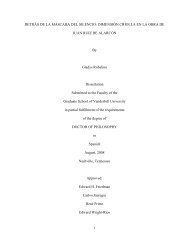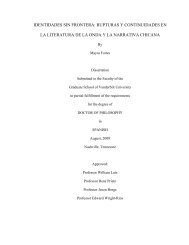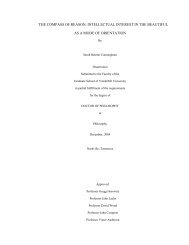THE DEATH OF DIONYSOS - ETD - Vanderbilt University
THE DEATH OF DIONYSOS - ETD - Vanderbilt University
THE DEATH OF DIONYSOS - ETD - Vanderbilt University
You also want an ePaper? Increase the reach of your titles
YUMPU automatically turns print PDFs into web optimized ePapers that Google loves.
that his middle-class origins reduce his personal worth to specialized knowledge and<br />
skills, and to the bottom line of a balance sheet. Of middle-class merit Wilhelm<br />
complains, “‘[Der Bürger] soll einzelne Fähigkeiten ausbilden, um brauchbar zu werden,<br />
und es wird schon vorausgesetzt, daß in seinem Wesen keine Harmonie sei, noch sein<br />
dürfe, weil er, um sich auf eine Weise brauchbar zu machen, alles übrige vernachlässigen<br />
muß’” (291). [“‘(The burgher shall) develop() some of his capabilities in order to be<br />
useful, but without it ever being assumed that there is or ever can be a harmonious<br />
interplay of qualities in him, because in order to make himself useful in one direction, he<br />
has to disregard everything else’” (EAB 175).] What good is it, he wonders, to have<br />
material affairs under control, “‘wenn ich mit mir selber uneins bin?’” [“‘if I am at odds<br />
with myself?’”] (290; DWH). His fear, we see, is that vocational specialization will<br />
alienate him from himself.<br />
Wilhelm’s anxiety, that a conventional vocation will jeopardize his harmonious<br />
identity, may be traced to the middle-class separation of public and private life, a<br />
distinction virtually absent in the representative world of the aristocracy. 16 He fears that,<br />
amid the hustle and bustle of providing goods or services, his self will get neglected.<br />
What use is it to him if he manufactures good iron, he asks Werner, if his inner self is<br />
“‘voller Schlacken’” [“‘full of slag’”]? (289-90; EAB 174). He worries that his<br />
personality will get lost somewhere between production and consumption; that it needs<br />
conscious cultivation if he is to realize the Bildung (literally, formation) of his self or<br />
personality. His theatrical ambition has been fueled at this point in the novel by his recent<br />
16<br />
Jürgen Habermas has analyzed “bürgerliche Öffentlichkeit” [“burgher publicity”] and has shown<br />
how it distinguished itself from the “repräsentative Öffentlichkeit” [“representative publicity”] of<br />
the nobility. According to Habermas, this was due in part to the fact that the public life of the<br />
burgher was constituted in its relation to a private life, notably absent in the society of the court,<br />
and the exclusion of the same from public interest only signified its characteristic intimacy and<br />
ideality in middle-class consciousness. See Strukturwandel der Öffentlichkeit: Untersuchungen zu<br />
einer Kategorie der bürgerlichen Gesellchaft [The Structural Transformation of Publicity:<br />
Investigations into a Category of Burgher Society], 6<br />
11<br />
th ed. (Frankfurt a/M: Suhrkamp, 1999). See<br />
especially chapter 6, “Die bürgerliche Familie und die Institutionalisierung einer<br />
publikumsbezogenen Privatheit” [“The Burgher Family and the Institutionalization of a Public-<br />
Oriented Private Life”], pp. 107-16. Of the philosophical literature that comes under consideration<br />
in this study, Habermas’s analysis has unique relevance, as it includes a brief excursus treating<br />
Wilhelm Meisters Lehrjahre as a model of the competing visions of aristicratic vs. middle-class<br />
public life. See “Exkurs: Das Ende der repräsentativen Öffentlichkeit, illustrated am Beispiel<br />
Wilhelm Meister” [“Excursus: The End of Representative Publicity, Illustrated with the Example<br />
of Wilhelm Meister”], pp. 67-69.



